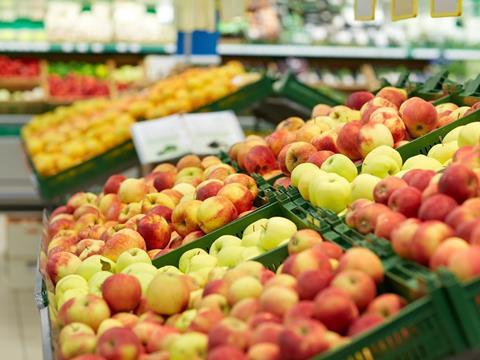
Tesco is supporting a government ban on fruit and vegetable packaging in a bid to prevent inequalities between market competitors when combating waste – although other retailers have voiced their concerns about selling fresh produce loose, from product quality to consumer uptake.
Originally published in The Grocer, Tesco’s statement encourages “effective government intervention on produce packaging removal” – adhering to its previous strategic report calling for a “level playing field” when removing packaging in produce.
It hopes that, if the government intervenes, it can unlock a transition at scale in which adjustments to packaging will not put individual retailers at a disadvantage, creating a level playing field. The retailer recommends starting with products for which multiple retailers share the same supplier and other, similarly “achievable” adjustments.
This aligns with WRAP’s warning that the UK Plastic Pact’s target of selling 30% of fruit and vegetables loose by 2025 could be missed if new regulation is not introduced. Reporting that only one in five fruit and vegetable products are sold loose, it is pushing for a similar ban to those introduced in France and Spain – and asserts that, if only apples, bananas, and potatoes were sold loose, an annual rate of 8,800 tonnes of plastic packaging could be saved every year.
Other retailers contacted by The Grocer warned that taking legislation too far could have “unintended consequences”. This includes Waitrose, which is currently in the process of revising its policy concerning a ban.
“All retailers have a responsibility to eliminate unnecessary packaging, and make sure any items used are easily recyclable,” said a spokesperson. “We also need to see collective action, with retailers working together to find solutions on a national and global level.”
Another from Lidl added: “Continued collaboration across the sector is key to progress, and whilst we support positive developments that help the industry to meet targets, they must be realistic and backed by robust evidence to avoid unintended consequences such as an increase in unnecessary food waste.”
Anonymous statements from other supermarkets underlined potential risks of increased food waste, bruising, exposure to pests, and other product damage should packaging be removed from fresh produce; and the requirement for barcodes in self-service and consumer preference for wrapped goods are also raised as issues.
Other points raised in a statement from Copa-Cogeca, Freshfel Europe, and Europatat calling for the Packaging and Packaging Waste Regulation to reconsider a ban on plastic fruit and vegetable packaging under 1.5kg in weight include compromised hygiene, organoleptic quality, and traceability in loose products. Instead, it recommends cutting down on unnecessary packaging, encouraging a transition into recycled, compostable, or degradable packaging wherever possible, and enhancing Member States’ collection, sorting, and recycling management.
At the beginning of this year, Tesco joined forces with Keep Sea Blue – setting its sights on keeping 500 tonnes of discarded plastics out of the ocean by implementing recycled plastics into its fresh fish packaging.
It then made a similar move to recover and recycle plastic trays into its chilled ready meal packaging via a PET recycling initiative designed in partnership with Faerch.
In May 2023, the retailer announced that, since the launch of its Remove, Reduce, Re-use, Recycle packaging strategy in 2019, it had removed over two billion pieces of plastic from its UK business; this was followed by the rollout of a ‘pillow pack’ in the hopes of reducing 70% of plastic from its fresh beef mince, and a transition into clear caps for its own brand milk to keep 3,900 extra tonnes of recycling plastic in the loop.
Additionally, it has collected flexible plastics from its shoppers, which Plastic Energy has converted into optimal oil feedstock to be combined with virgin material by SABIC. The alternative feedstock has created recycled, food-contact-approved plastic pellets for Berry Global to turn into Heinz Snap Pots.
If you liked this article, you might also enjoy:
The L’Oréal approach to packaging sustainability
The way we talk about plastic needs to change – here’s how to get it right
What steps is Apple taking to make its packaging more sustainable?














No comments yet